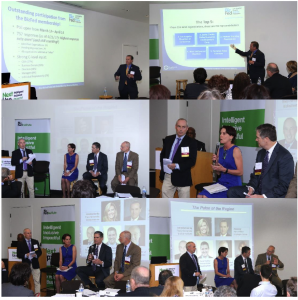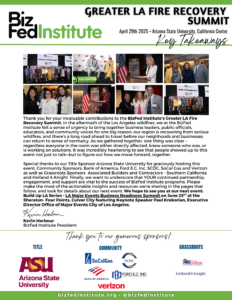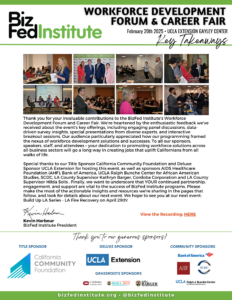
The New Administration’s First 100 Days Synopsis
Onni Times Square – Friday, April 21, 2017
Thank you to our generous sponsors: AES Southland, Majestic Realty Co., Southern California Gas Company, and Randy Witt Productions.
You can experience the BizFed Institute’s NextUp Economic Forum: The New Administration’s First 100 Days in its entirely online via YouTube. Please click any of the following links for the segment you wish to view or view full playlist here:
- Introduction by Gilbert Ivey, 2017 BizFed Institute Chair; and David Fleming, BizFed Founding Chair.Â
- First 100 Days – Alec BaumÂ
- First 100 Days – Congresswoman Judy Chu
- First 100 Days – Attorney General Xavier Becerra
- First 100 Days – Antonio Villaraigosa
- The Pulse of the Region – Mark Wilbur
- The Pulse of the Region Panel
- California Dreamin’Â Luncheon Presentation
- California Dreamin’Â Panel
To view full slideshow, click here.
To view Speakers’ full bios, click here.
Speakers:
The Honorable Judy Chu, U.S. House of Representative
The Honorable Xavier Becerra, Attorney General, State of California
Antonio Villaraigosa, 41st Mayor of Los Angeles & CA Gubernatorial Candidate
Alec Baum, Co-Founder, Track Trump
Summary:
In the first segment aptly titled First 100 Days, Track Trump’s Co-Founder Alec Baum provided a solid backdrop to start us off at the forum and highlighted active or pipeline priorities of the Trump Administration during the first 100 days. Given the competing narratives by media, he stated that the reality of the Administration’s outcomes probably fell somewhere between “failures†and “subtle victories” as we neared the milestone. When our Democratic leaders spoke, aside from the expected emphasis on immigration, health care, and infrastructure for California, two messages stood out: 1) despite challenges from the federal side, the state will resolve to chart its own path and as emphasized by Attorney General Xavier Becerra, continue to stay ahead as the leader on issues like climate change and healthcare, and 2) one of the biggest obstacles for the GOP in Congress is finding consensus among its divided Republican caucus to pass legislation.  With taxes looming as the perennial dark cloud for businesses, Congresswoman Judy Chu projected that Congress will be addressing tax reform around August and Antonio Villaraigosa agreed with other bipartisan organizations that “the only real way to tackle a broken tax system is to tackle the whole thing; you can’t do it piecemeal.”
The Pulse of the Region
Speakers:
Mark Wilbur, President & CEO, Employers Group
Dan Schnur, Professor, University of Southern California
David Hadley, Former State Assemblyman, Small Businessman & Possible CA Gubernatorial Candidate
Rick Jacobs, Principal, RDI Strategic Advisors, former Deputy Chief of Staff and Executive Vice Mayor, City of Los Angeles
Kimberly Ritter-Martinez, Economist, LAEDC Institute for Applied Economics
Summary:
The Pulse of the Region presentation and panel discussion, with Employers Group CEO Mark Wilbur and Dan Schnur leading the way, released the BizFed Pulse Poll’s preliminary results that showed taxes and fees at the forefront of concern in the business community for the seventh year in a row. One interesting observation noted by David Hadley pointed to those who didn’t take the survey; that is, survey respondents represent companies who stayed, but not those who left California or decided to forego investing here due to local and state policies that drive business away.  We may have an opportunity to explore outmigration, disinvestment, etc. from this standpoint.  Kimberly Ritter-Martinez noted that with automation in the workforce and a paradigm shift in manufacturing, one of LAEDC’s main goals is to invest in human capital and develop training programs to address industry needs. Despite these challenges, Rick Jacobs asserted that the City of Los Angeles is humming; for example in recent years, more than 180,000 new businesses started, foreign investments have reshaped the skyline with new developments, and there’s a renewed focus on creating business-friendly processes. At the same time, poll respondents once again ranked the City of Los Angeles as the least business-friendly in the county.  This pervasive perception gap between government and businesses requires more exploration.
California Dreamin’Â Keynote Luncheon
Speakers:
Larry Kosmont, President & CEO, Kosmont Companies
David Lesher, Co-Founder, Editor & CEO, CALmatters
David Nott, President & CEO, Reason Foundation
Summary:
The California Dreamin’ Keynote Luncheon presented challenges and opportunities beyond the current snapshot of the economy and business climate. With the expert guidance by Kosmont Companies’ Larry Kosmont, along with media thought leaders at CALmatters and the Reason Foundation, the speakers reflected mostly from an economic vantage.  Kosmont stressed a balance in dealing with the federal government to avoid dire consequences for local jurisdictions who rely on federal money, highlighted ways to induce private investments, and pointed to the “scalding” level of technology expecting to replace about 50-60% of existing jobs.  CALmatters’ Dave Lesher described the opportunity leading into the future for multimedia to collaborate in new ways that weren’t possible before, such as creating statewide dialogues through online media, radio, etc. that carry stories over time across multiple platforms on issues like tax reform and apropos to this segment, What Happened to the California Dream? slated to launch in September.  Reason Foundation’s David Nott noted private investments and transportation/mobility as opportunities, while the Trump Administration’s pressure against trade, immigration and marijuana were seen as threats to our economy.  He offered another take on how to perceive the competition between elected bodies from the local to national level, even within the state between jurisdictions – this competition creates performance and is healthy for our state and the country to work out the tough questions.
Conclusion & Next Steps
Throughout the forum, leveraging public-private partnerships was echoed among the speakers and one of the key takeaways from our forum. Especially with hundreds of millions of dollars in private investments, making use of economic development tools such as Enhanced Infrastructure Financing Districts (EIFDs) or Community Revitalization and Investment Authorities (CRIAs), given to cities by the state, can address issues that we grapple with regionally and statewide, including infrastructure, jobs, housing, and transportation.  With the Trump Administration’s emphasis on infrastructure investment and public-private partnerships, we have a unique opportunity in California to fix our state’s crumbling transportation, water conveyance, and energy projects. BizFed Founding Chair David Fleming summarized it well by saying that we need to encourage government to look at every single problem to get investment and return, so that we don’t have to worry about increasing taxes, fees, etc. Â
The BizFed Institute (BFI) will be publishing the post-forum intelligence report in the coming weeks featuring core challenges and proposed solutions, detailed segment highlights, and a recommended action plan.  To stay in touch on NextUp Economic Forum developments, join in tackling critical economic issues, and learn more about BFI programs, please contact us or sign up to receive updates by visiting bizfed-inst.kernsites.com/contact-us.






